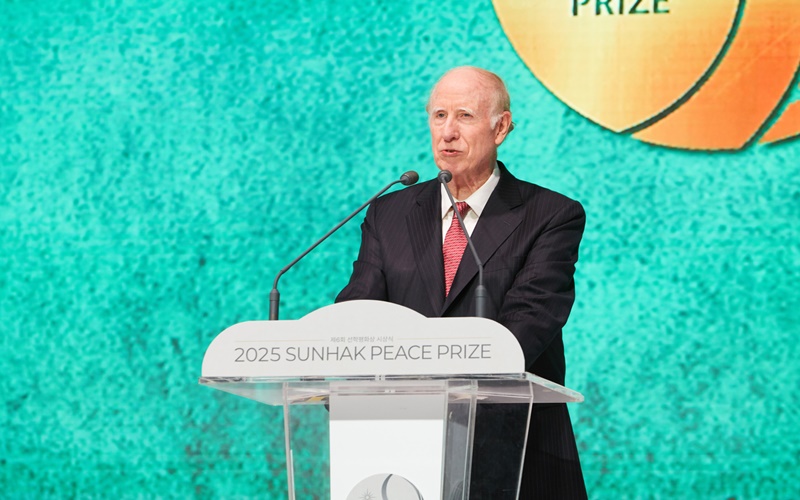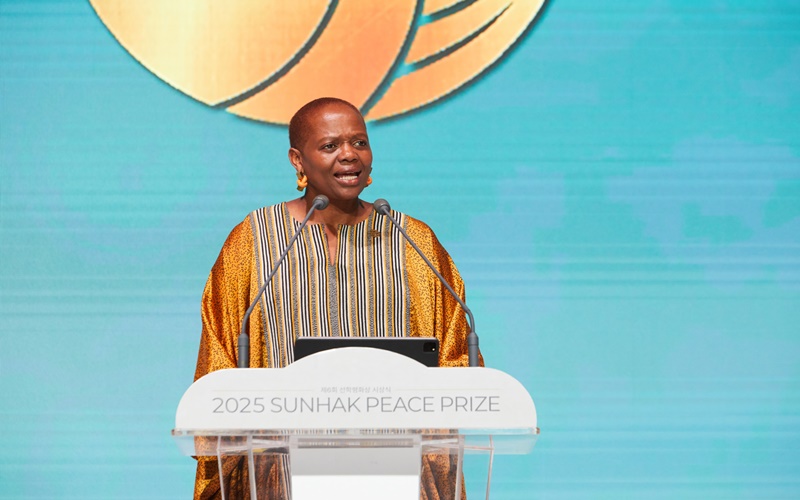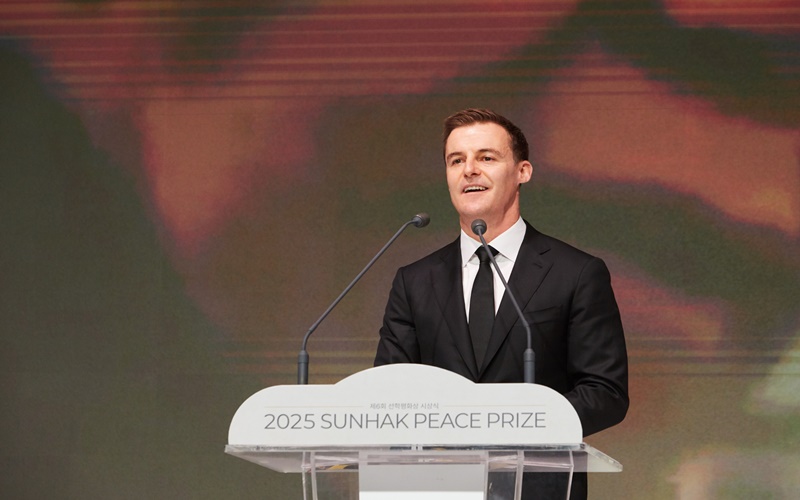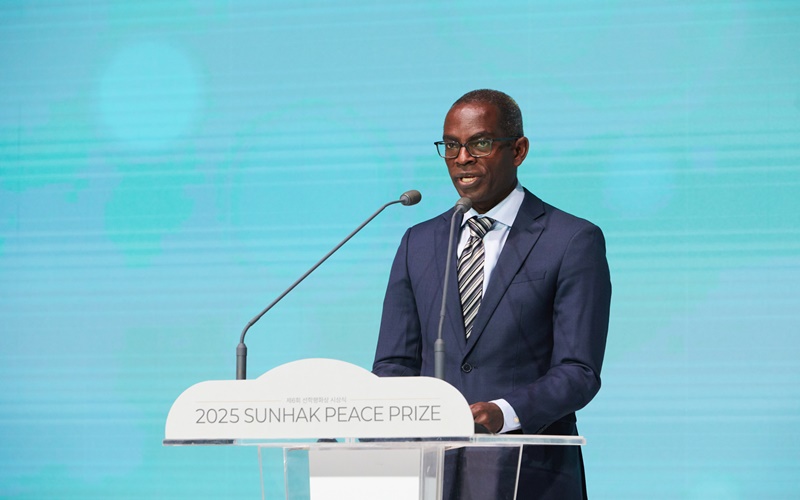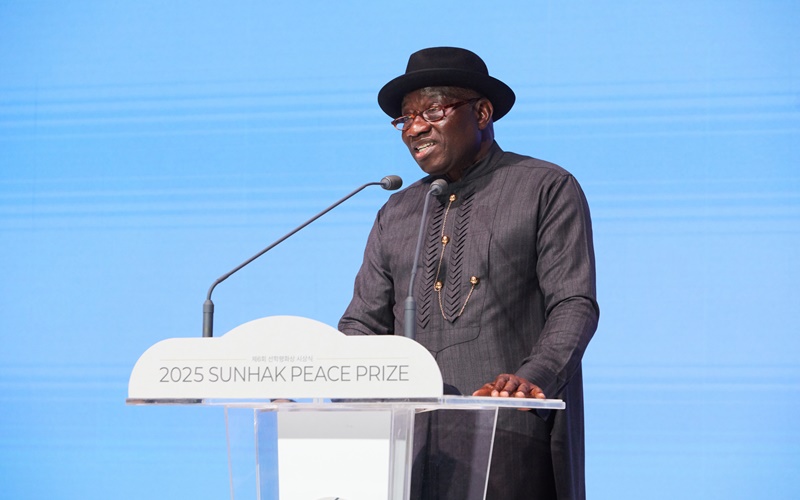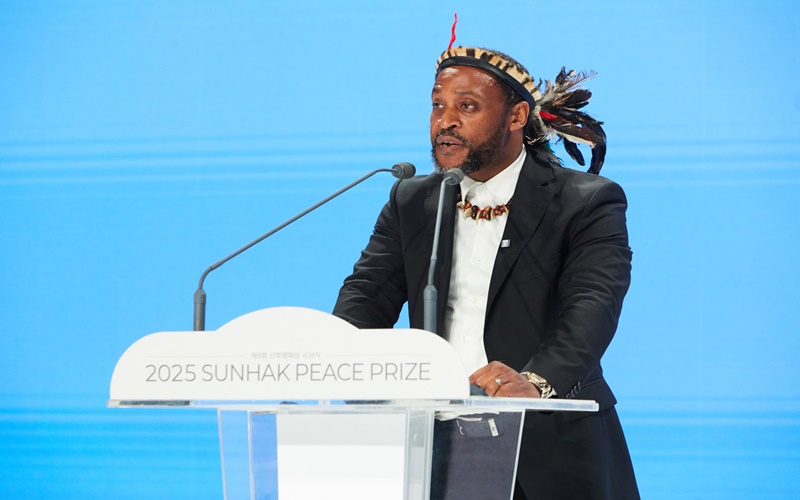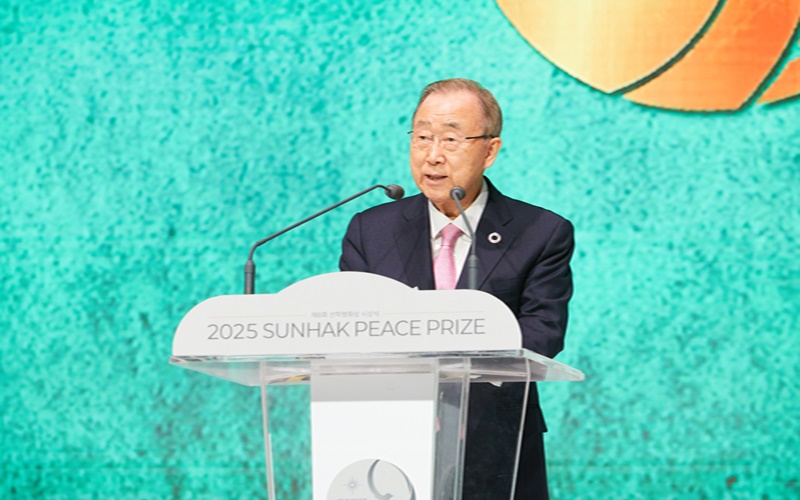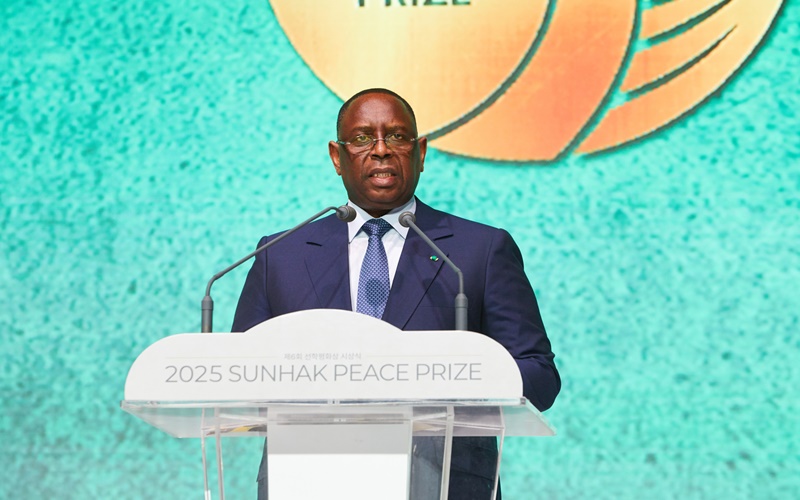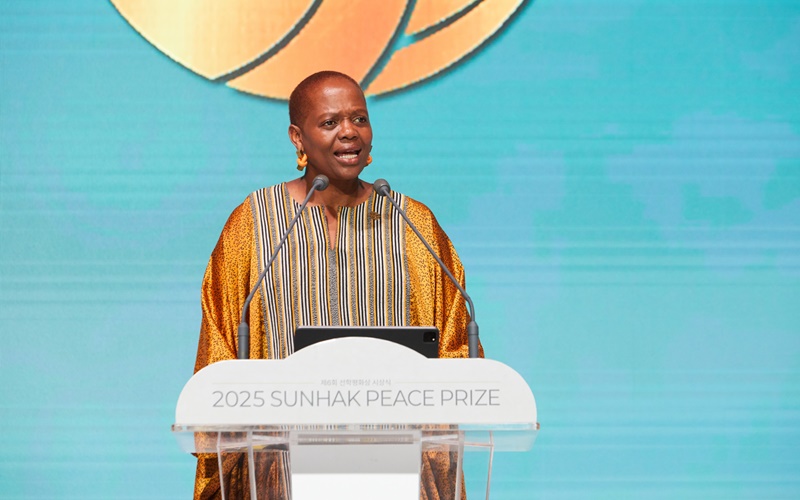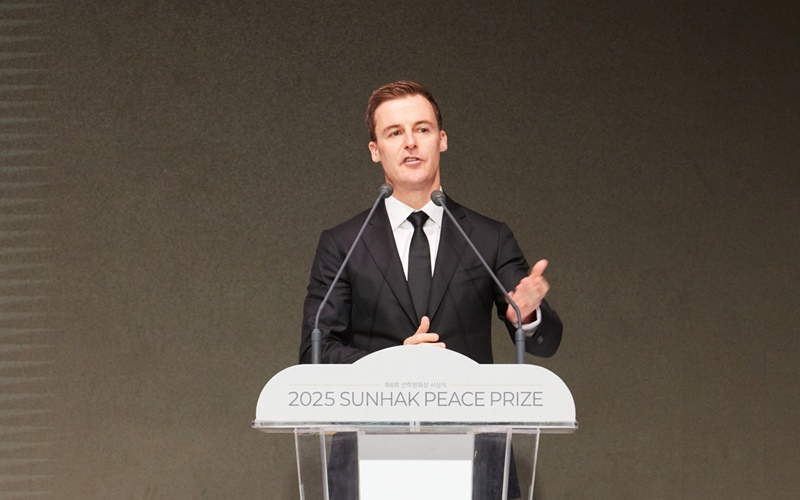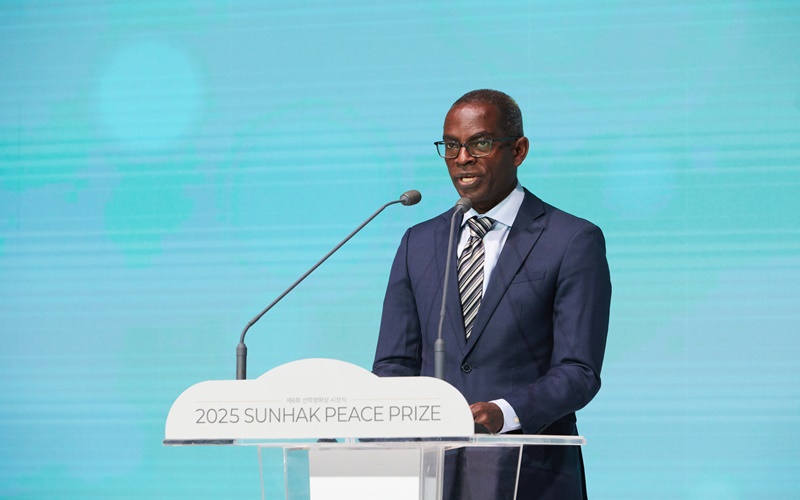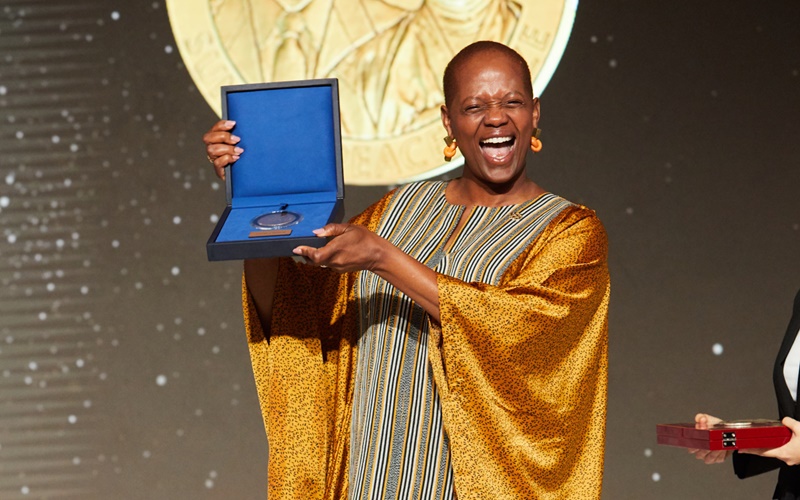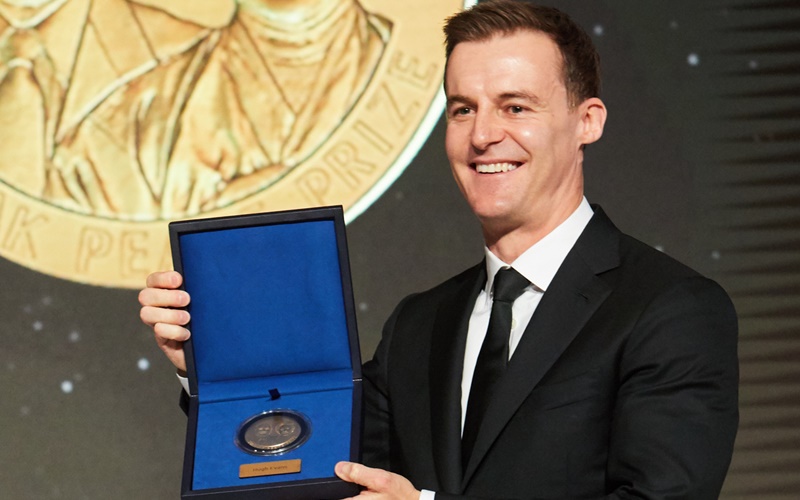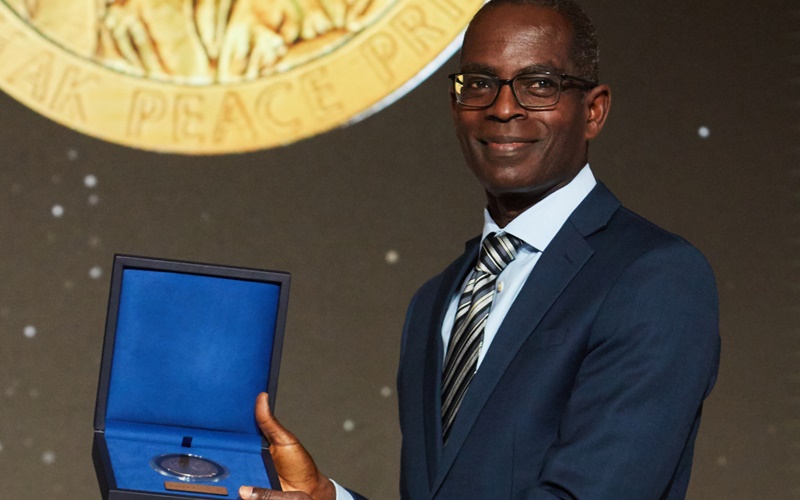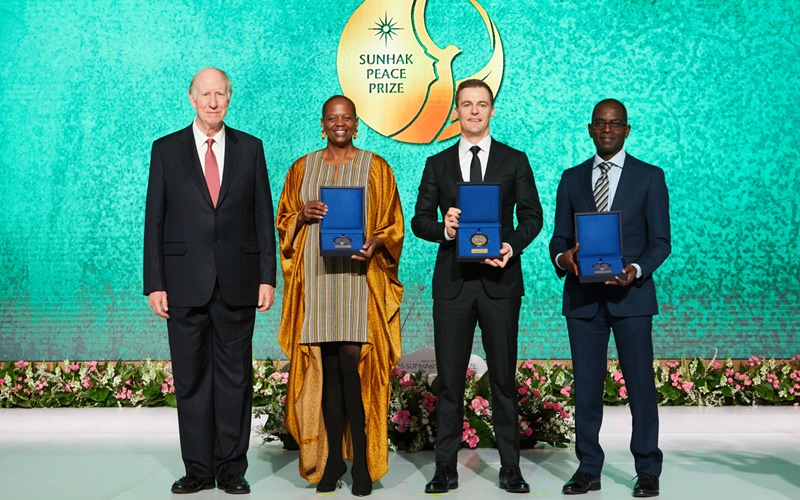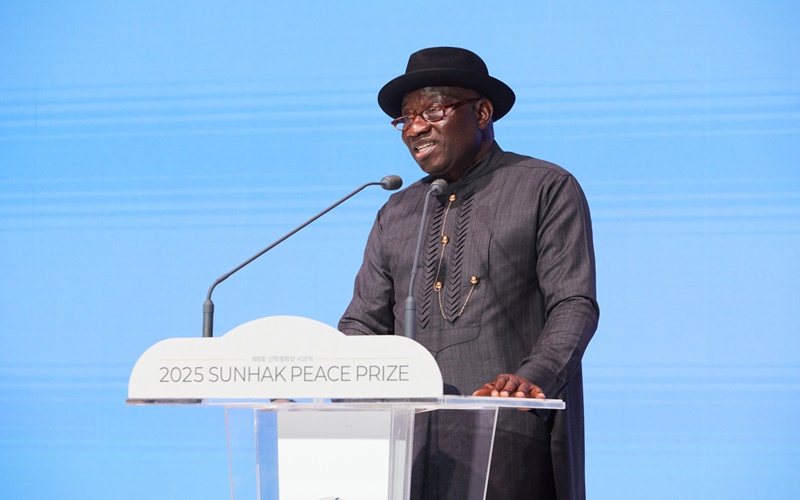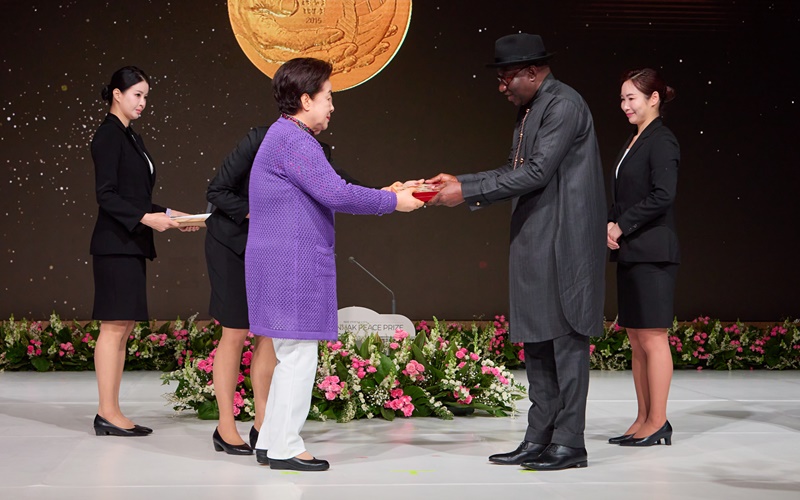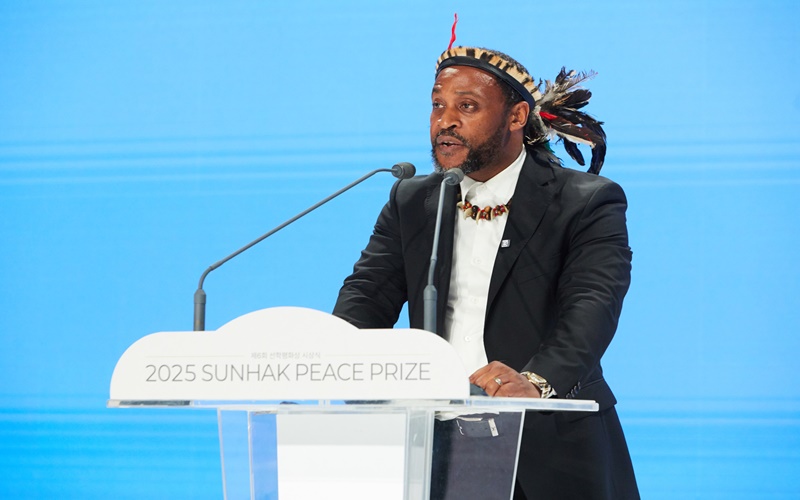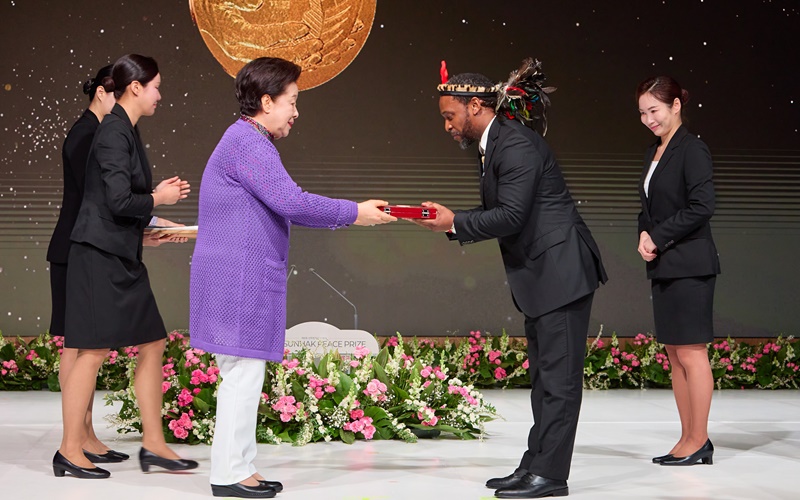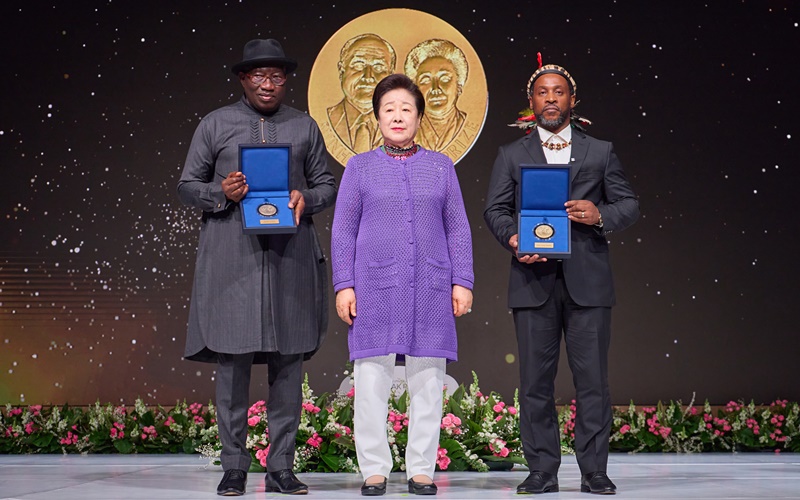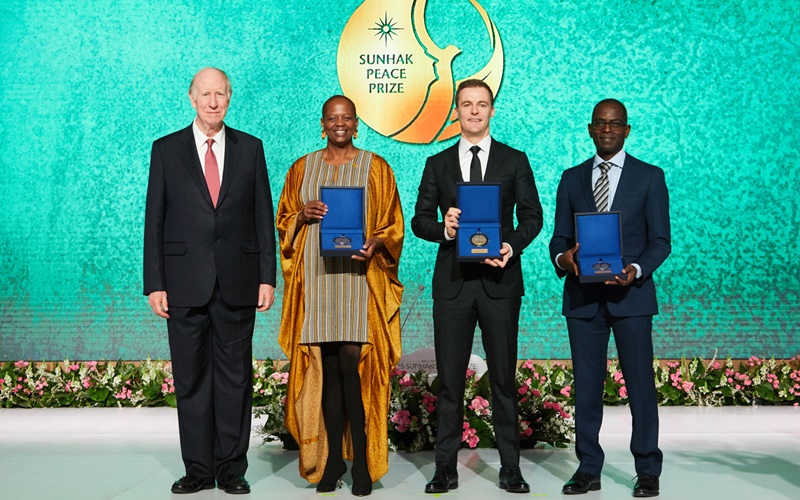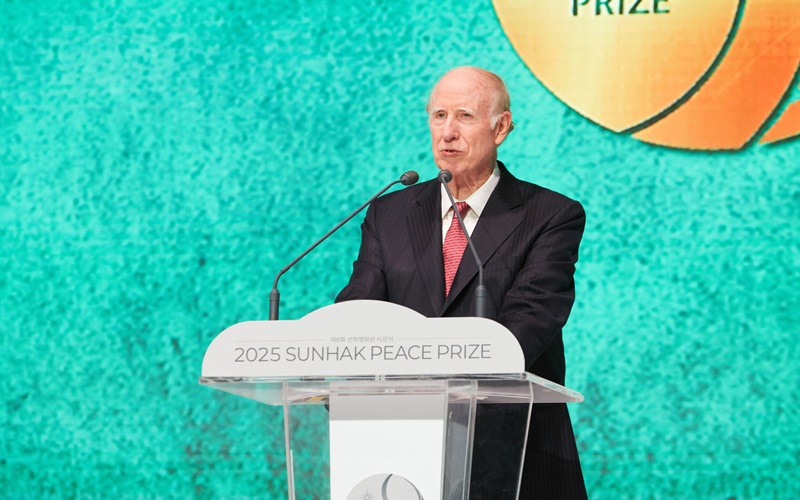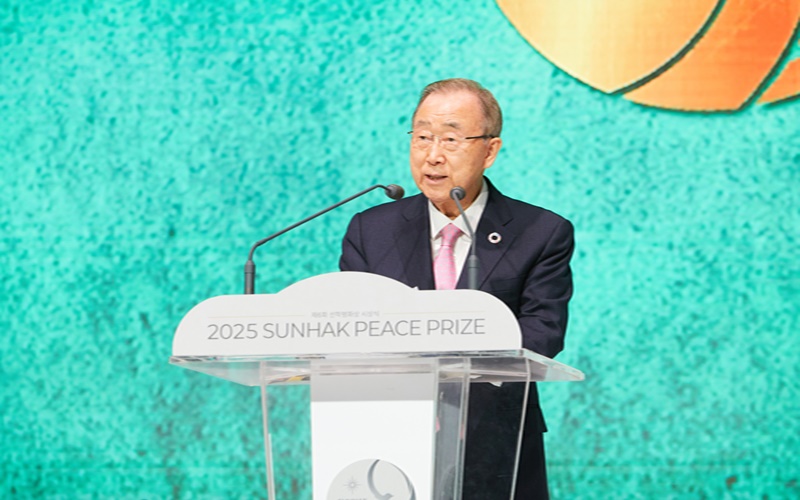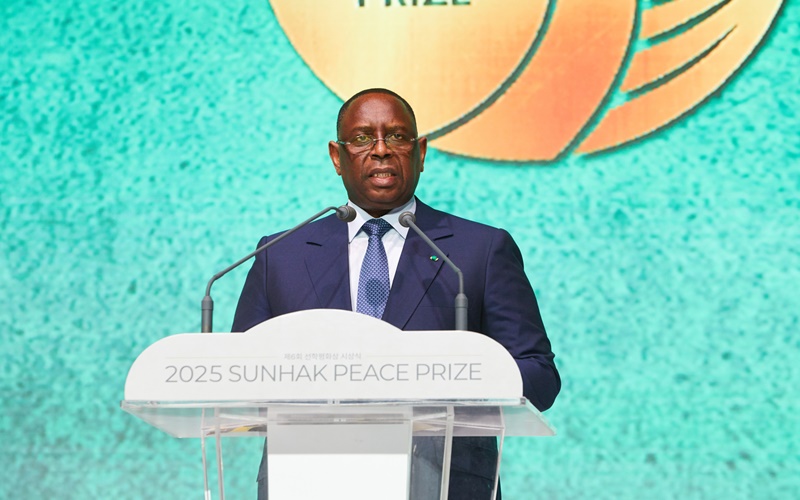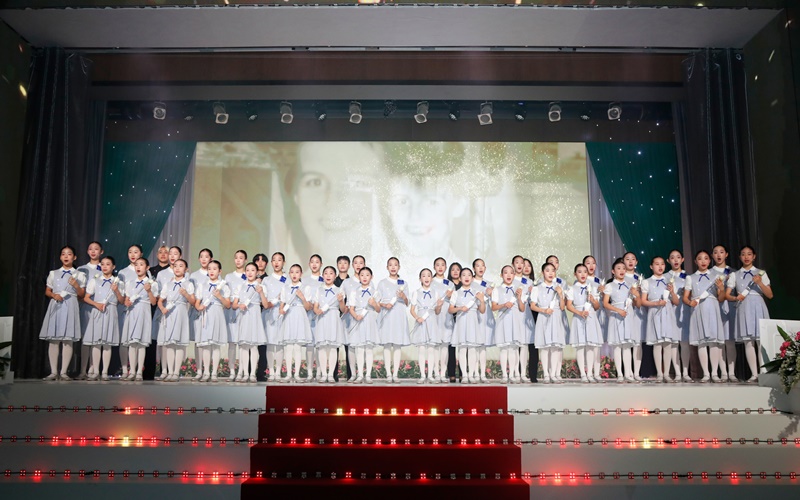2025Sunhak Peace Prize
Award Ceremony
- Date
- 2025 April 11
- Location
- Lotte Hotel World, Seoul, South Kore




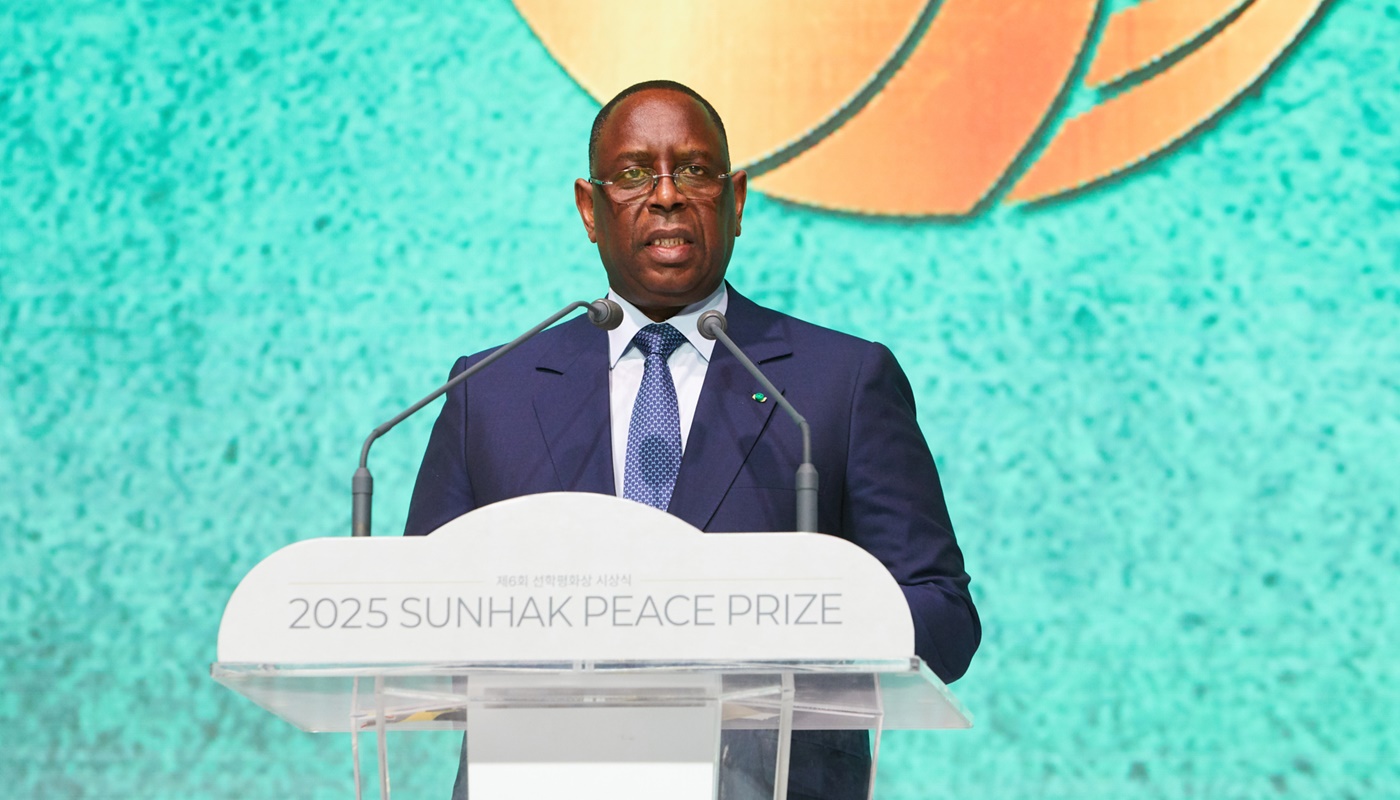







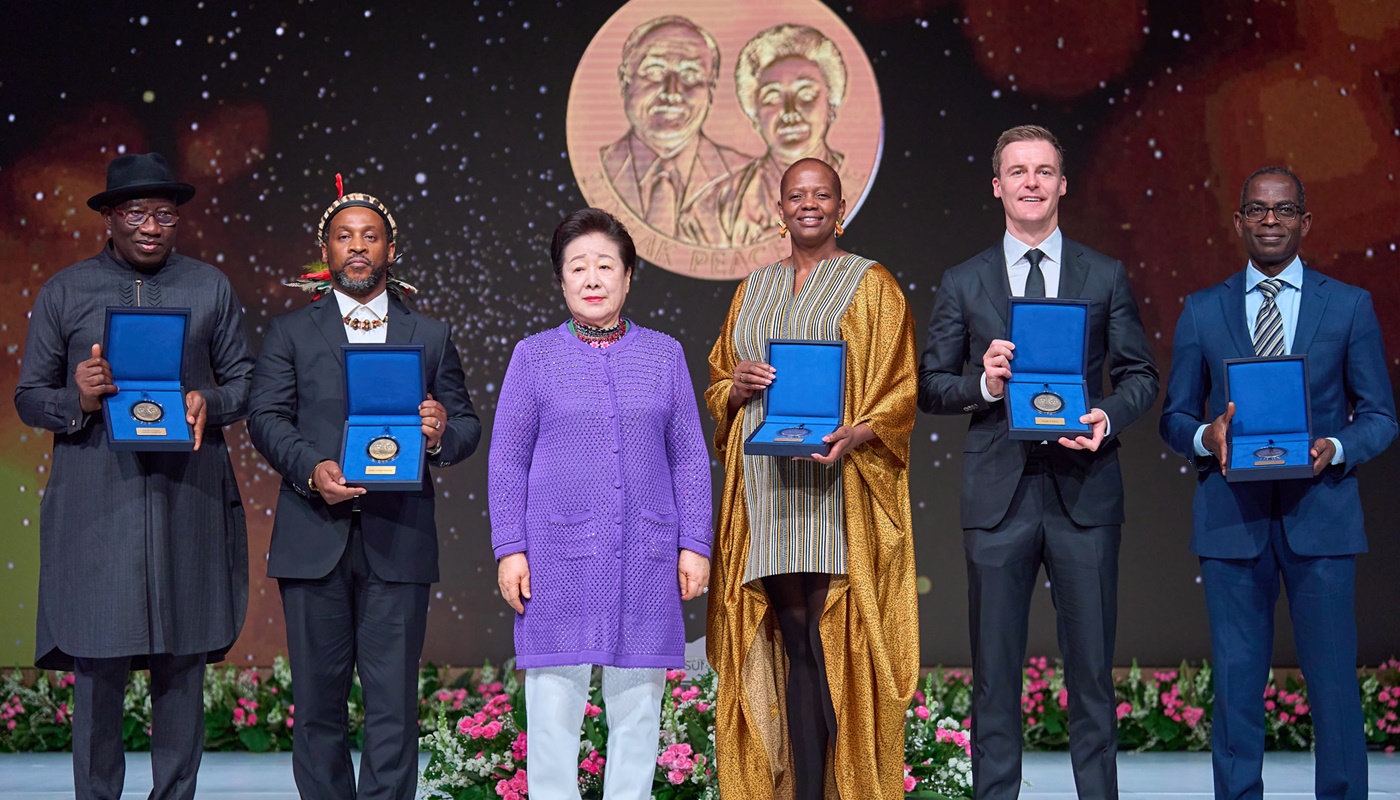


-
Sunhak Peace Prize Introductory Video
![선학평화상 소개영상 썸네일]()
-
Award Ceremony Video
![시상식 전체영상 썸네일]()
Welcoming Address
- Jose Manuel Barroso
- Co-Chairman, Sunhak Peace Prize Committee
Esteemed distinguished guests, ladies and gentlemen,
Today, we gather here on this meaningful occasion to honor three exceptional leaders who have devoted themselves to realizing the ideals of peace and humanity. It is my great privilege to welcome you all to the 2025 Sunhak Peace Prize Award Ceremony. The distinguished names of Wanjira Mathai, Hugh Evans, and Patrick Awuah will forever shine brightly in our hearts as beacons of hope for peace.
Wanjira Mathai, Chair of the Green Belt Movement, has passionately championed climate justice and environmental protection, initiating widespread tree-planting movements across Africa and paving the way for sustainable ecosystem restoration. Her tireless efforts have profoundly underscored to the world that environmental conservation is indeed foundational to lasting peace.
Hugh Evans, CEO of Global Citizen, has brilliantly combined digital activism with the goodwill of people worldwide through the largest global philanthropic platform, uniting countless voices. He has dismantled formidable barriers of poverty and inequality, restoring dignity and hope to millions. Through his endeavors, we are reminded anew of the immense transformative power that social justice and collaboration hold.
Patrick Awuah, President of Ashesi University, has fostered an innovative and creative educational environment centered on ethical leadership and advanced IT education, empowering Africa’s youth. His visionary approach inspires young leaders to drive Africa's development, enabling them to actively create a peaceful, prosperous, and sustainable future.
The theme of this 2025 Sunhak Peace Prize is "Innovation for Peace," spotlighting leaders who have overcome global challenges through creative and sustainable solutions. True innovation transcends technological advancement—it reshapes our perspectives, enhances policy frameworks, and transforms the very structures of international cooperation. It is thanks to the dedication and courage of such innovative leaders that we can confidently progress toward a brighter, more hopeful future.
On this occasion, I express my sincere admiration and gratitude for the extraordinary efforts and noble contributions of these three remarkable individuals. Your passion and dedication profoundly inspire us all, strengthening our hope for a world imbued with peace and justice. May your journeys ahead continue to illuminate lives with hope, promoting the enduring values of peace and human rights.
Once again, my heartfelt congratulations to Wanjira Mathai, Hugh Evans, and Patrick Awuah on this prestigious honor. May your noble endeavors grow like seeds of peace and love, blossoming into a more beautiful and just world.
Thank you.
Welcoming Address
- Thomas G. Walsh
- Co-Chairman, Sunhak Peace Prize Committee
Your Excellencies, distinguished guests, ladies and Gentlemen,
On behalf of the Sunhak Peace Prize Committee it is my honor to welcome you to the 2025 Sunhak Peace Prize Award Ceremony.
Today we will honor five remarkable individuals who have
devoted their lives to planting seeds of peace across the world.
As we know, peace does not become a reality automatically or naturally like the sunrise. It comes into being, like any great work, on the foundation of the investment of time, energy and creativity, guided by a moral and spiritual vision, and requiring courage, resolve and conviction. Such work for peace will be on display today.
The Sunhak Peace Prize was established in 2014, born from
the noble ideals and far-reaching vision of the late Rev. Sun Myung Moon and
brought to life through the unwavering dedication of Dr. Hak Ja Han.
Throughout their lives, Rev. and Mrs. Moon have taught us
that a lasting peace can only be achieved when we transcend barriers that
divides us and learn to relate to one another with love, compassion and respect
for each person’s God-given dignity and value.
Those we honor today are truly
remarkable individuals who exemplify the ideals, principles and practices
affirmed by the Sunhak Peace Prize. These laureates are not bystanders in the
arena of history. Their life stories are testimonies to what is possible when
conviction, compassion, and conscience converge—and give rise to action.
I hope today’s program will be an inspiration to each one
your you. I pray it will move each of us to deeper self-reflection, and
ultimately to action. Let us remember that peace begins with each one of us. It
emerges from the choices we make in our daily lives—choices that are guided by
a vision that sees all human beings as members of one global family under God.
Thank you for your kind attention.
Acceptance Speech
- Wanjira Mathai
- Managing Director Africa & Global Partnerships, World Resources Institute (WRI) and Chair of Wangari Maathai Foundation
April 11, 2025
Distinguished guests,
esteemed colleagues,
dear friends,
What a profound privilege it is to stand here today, joining the remarkable family of Sunhak Peace Prize Laureates.
This moment fills me with deep gratitude and humility—to be recognized by a Prize dedicated to resolving worldwide suffering, conflict, poverty, and environmental threats, and guided by a mission rooted in sustainable development, conflict resolution, and ecological conservation. Khamsamida.
To the Sunhak Peace Prize Committee, thank you for seeing the value of our work and for this extraordinary honor.
Chairman Ban Ki-Moon, your tireless leadership at the helm of the UN and your unyielding commitment to peace and adaptation have inspired countless individuals, including me. It is an honor to stand alongside you and other peacemakers. My late mother, Wangari Maathai, was deeply proud to serve as one of your UN Messengers of Peace in 2009—a bond that continues to shape the legacy I carry forward.
President Macky Sall, thank you for your kind words of support and encouragement. I am also delighted to share this special moment with my daughter Elsa, whose love and enthusiasm fuel me every day, along with my family—Ruth and Papa—who have always been my steadfast cheerleaders. Thank you for your sacrifices, patience, and boundless belief in me.
Words feel insufficient to express the depth of gratitude I feel right now. In moments like these, we are reminded that we stand on the shoulders of giants—those who paved the way for us, who faced adversity with courage, and who proved that lasting change is possible.
My greatest inspiration has always been my mother’s belief that the most meaningful work is that which benefits others. She instilled in me the principle that true satisfaction comes from service to others—a lesson that guides my every decision.
Today, as the Managing Director for Africa and Global Partnerships at the World Resources Institute, Chair of the Wangari Maathai Foundation, and a Full Member of the Green Belt Movement, I wake up every day driven by our mission to catalyze inclusive transformation for people and planet. From championing global movements for nature protection and restoration, to supporting the restoration of Kenya’s landscapes to empowering young Africans to lead with courage, our work represents the hope and resilience we are building for generations to come.
At WRI, our focus is on fostering a just transition—transforming national economies in ways that align with nature, people, and planet, ensuring shared prosperity and deep, lasting resilience. To be recognized with the Sunhak Peace Prize during such turbulent times—particularly when my region, Africa, and my country, Kenya, face immense vulnerability—is an incredible honor.
The vision set forth by Rev. Dr. Sun Myung Moon and Dr. Hak Ja Han Moon, of peace built through collaboration, service, and upliftment of the most vulnerable, resonates deeply with me. It reminds us that humanity is bound by our shared responsibility for one another—where every person, family, and nation plays a role in serving the greater good.
Despite the significant headwinds of recent political and environmental challenges, the economic and scientific case for climate and development goals remains unequivocal. For Africa, where countries lose up to 5% of GDP responding to climate extremes, and governments redirect nearly 9% of budgets to these crises, the need for transformation is urgent. We must recalibrate, not only as nations but as a united community, to prioritize self-reliance, resilience, and sustainable innovation.
This is Africa’s turning point—not just for governments, but for citizens. Economic development is not optional; it is the foundation of our ability to adapt, to thrive, and to lead.
South Korea offers an inspiring example, having achieved transformative economic growth and innovation through bold investments in youth leadership and inclusive development. In the 1970s, Kenya and South Korea shared a similar development trajectory. Today, South Korea stands as an Asian tiger, proof that intentional strategy and commitment can lead to extraordinary progress.
Africa’s green competitive advantage—the youngest, fastest-growing workforce, abundant renewable energy potential, and critical raw materials—positions us as a vital player on the global stage. This moment demands action. Africa must package and market its strengths, turning its green promise into transformative impact.
It is time for Africa to rise, redefine its narrative, and focus on creating value that transforms our continent on our own terms. Public-private partnerships with friends of Africa like many of you here, investment in innovation, and bold leadership will be the keys to unlocking Africa’s immense opportunities. This work is urgent, but it is within reach.
Being recognized here today ignites in me a renewed fire to continue fighting for Africa’s dignity, prosperity, and sustainability.
I dedicate this award to Kenya’s youth who remind me every day that we WILL build a future that reflects the greatness of Africa, rooted in resilience and courage.
Thank you for this incredible honor.
Acceptance Speech
- Hugh Evans
- Co-founder of Global Citizen
April 11, 2025
GAHM SAH HAHM NEE DAH
Dr. Moon for this honour.
I accept this SUN-hak Peace Prize with gratitude.
I accept it on behalf of our team at Global Citizen, our private sector partners and the artist and advocacy communities who selflessly help make our work possible.
At the beginning of my career, I had the opportunity to live and work in Kwazulu-Natal in South Africa.
It was a period of renewed optimism following Nelson Mandela’s leadership in the 1990s.
But it was also a period of great despair at the epicentre of the HIV / AIDs epidemic leading to massive inequality and a generation of children orphaned.
And while I have been passionate about ending poverty all my life, the founding principles of Global Citizen were inspired by the words of Mandela when he said in one of his final speeches that:
Overcoming poverty is not a gesture of charity, but it’s an act of justice. He said, like slavery and apartheid, poverty is not natural. It is man-made and it can be overcome and eradicated by the actions of human beings.
Mandela’s vision has remained a north star for me throughout my life, inspiring so much of Global Citizen’s mission and my work.
Succeeding on critical global issues like a sustainable climate and giving every child access to a quality education - much like achieving lasting peace - demands an unwavering commitment to justice.
A collaborative effort that doesn’t stop at promises-made, but ensures leaders turn their commitments into real, measurable action.
The movement we have built at Global Citizen is testament that anyone can drive significant impact and create meaningful change for our planet and our most vulnerable.
After having seen first hand - in South Africa and the Philippines - the systemic issues that keep people trapped in poverty, I teamed up with a friend while I was at University to launch our first major campaign ahead of the G20 leaders coming to Australia.
We created a rallying cry for the world’s most marginalised, a concert - Make Poverty History - headlined by Bono and Pearl Jam.
To our amazement, the Australian Government heard our collective voices and agreed to double its investment in International Development - an additional $6.2Bn to end extreme poverty.
Following that campaign we had the opportunity to bring our advocacy model to New York City and we have used our platform in Central Park for over a decade to campaign on some of the greatest issues of our time.
But today, our reach goes far beyond our annual festival on the Great Lawn in New York City.
At the invitation of Prime Minister Narendra Modi, Global Citizen brought Coldplay and Jay Z to Mumbai for one of the biggest concerts the country has ever seen, gathering 150,000 people in support of their Clean India campaign.
To celebrate Mandela’s centenary we convened a spectacular event in Johannesburg headlined by Beyoncé, JAY-Z, Ed Sheeran, Eddie Vedder, Pharrell Williams, Chris Martin, and Usher.
The event galvanised hundreds of thousands of global citizens to take action, calling on President Cyril Ramaphosa to commit $129million towards menstrual health hygiene programs - impacting millions of girls across their country by preventing them from missing school.
And…when the world shut down with the Covid 19 pandemic, Global Citizen produced One World: Together at Home.
It was the only broadcast during lockdown to be on in Russia, China and the United States simultaneously, it aired on all the major US networks, broke two Guinness world records and was seen in over 400 million homes.
It was a global moment that raised more than $127m for first responders in one night.
Through partnership and collaboration, we have built the world’s largest movement of action takers impacting billions of lives by defeating poverty.
And over the last decade, we have mobilized and distributed $49 billion, improving the lives of 1.3 billion people worldwide.
Our organisation empowers individuals to take action to tackle the world’s greatest challenges, so that global citizens, no matter where they were born, have the basic tools to succeed.
We believe development is the only way to enshrine a lasting peace.
But peace is not just the absence of violence or conflict.
Peace is freedom and dignity, and I believe it is something that only comes about through true global citizenship.
During challenging geopolitical times, we see close up the dangers of parochialism and isolationism. Look what happens when we ignore humanitarian crises or when we turn a blind eye to climate change.
Leaders who do so, do at their peril, and that of global stability.
These are all ultimately man-made global issues, and as such, they can ultimately only be solved by global citizens demanding global solutions from their leaders.
I’d like to commend the work of my fellow SUNhak laureates Dr. Mathai and Dr. Awuah. It is a great honour to be recognised alongside you.
As Mandela said, we must never forget that that which is man-made can be overcome by the collective actions of humanity.
Global Citizen is humbled by this recognition of our work to achieve this mission.
GAHM SAH HAHM NEE DAH.
Acceptance Speech
- Patrick Awuah, Jr.
- Founder of Ashesi University in Ghana
April 11, 2025
Distinguished Members of the Sunhak Peace Prize,
Your Excellencies,
Fellow Laureates,
Distinguished Ladies and Gentlemen:
I am honored to accept this award on behalf of the Ashesi University community, and on behalf of the African youth in whom Africa’s future rests.
I would also like to congratulate the people of South Korea for the economic miracle that you have created, from the 1950s when Korea was a developing country, to the economic powerhouse we see today. In the 1980s, when I was in college, one of my Economics professors described to us the work he did here in the 60s, assisting with Korea’s economic policy. He impressed upon us that economic transformation of countries such as Korea and Singapore, was not only a story about the road to prosperity in those countries. Your success in Korea has played a role in the current and future wellbeing of Asians everywhere in the world.
When my first child was born in the 1990s, those discussions about the economic transformation of Korea, and what it meant for the dignity of Asians, became more present in my mind. At the time, Africa was experiencing major challenges—many still present today—and I worried about what that meant, not only for my children, but for all African children around the world. I wondered how they would see themselves in a world where the continent was presented as a place of unfulfilled promise? And I began to feel a sense of urgency to be part of changing circumstances in Africa, and by extension the dignity of my children, for the better.
And so, in my mid-thirties, I left my career in the US to return to Ghana. My wife, Rebecca, who I could not have done this without, and a few friends and colleagues, agreed to go on this journey with me. In 2002, we established Ashesi University, a non-profit with a bold vision: to educate ethical entrepreneurial leaders who will drive innovation, growth and prosperity across Africa. Ashesi has now become recognised as one of the most forward-thinking higher education institutions in Africa. Our graduates, who are building and contributing to meaningful innovation and solutions, are considered as some of the best minds in the world. The University is ranked among the continent’s top ten most impactful; and our community continues to thoughtfully engage in work that advances the flourishing of the continent we call home. Our journey, too, is about the future wellbeing of a people.
As I reflect on the vision of Sunhak Peace Prize, let me share three stories from the students I have worked with, that demonstrate what we can accomplish when we selflessly work together and take the time to guide and listen to the next generation.
The first story is about a time when students from Ashesi were recruited by an international NGO to assist with conflict mediation at a refugee camp in Ghana. At the time, Ghana hosted refugees who had fled a civil war in Liberia. And it turned out that some of the inhabitants of the camp were former combatants who had carried their disagreements with them to Ghana. Our students quickly learned that mediation was difficult. They did not have training in conflict resolution, and the animosity between the parties seemed intractable. What would you do in this situation?
As they pondered what to do, the students noticed that many of the parties involved in this conflict were also engaged in micro enterprise and needed help managing those businesses and sustaining their livelihoods. So, they decided to run business management workshops. And they noticed something interesting. People who were once in conflict now sat next to each other learning how to run their businesses more effectively. During the workshops, conflict was put aside, and the attendees focused their attention on something positive. Everyone benefited, and conflict declined.
The second story is about the period from mid-2006 through the end of 2007 when students of Ashesi University engaged in an intense debate about ownership of a culture of integrity on our campus – a debate that culminated in a decision to adopt an honour system on campus. Under this system–a first in Africa at the time–students pledged to hold themselves individually and collectively responsible for ethical behaviour. Our faculty no longer invigilate exams, and students themselves hold each other accountable to mitigate cheating. All our first-year classes since 2008 are required to debate this matter and to decide by a 2/3rd majority or greater whether they want to adopt the honour code. Thanks to the culture of integrity and discipline that this system has fostered, Ashesi’s graduates are now considered among some of the most trustworthy by organisations and teams that recruit and work with them.
The third story is of a young man who learned about Ashesi University when our students volunteered as teachers in his rural community in Northern Ghana. With encouragement from the students, he applied to our institution and was accepted to attend with a full scholarship. Before he came to Ashesi, he had never used a computer. Yet, four years later, he graduated with a major in Computer Science; and for his final year research project, he designed and built a machine learning algorithm to diagnose malaria in blood with near-perfect accuracy. His goal was to help doctors in communities like his, with very little resource, better diagnose and cure malaria. This year, that student earned a PhD in Computer Science at Dartmouth College and is now pursuing his life passion to develop technology that improves lives and livelihoods in Africa’s most vulnerable regions.
There are key lessons I carry with me from these stories.
One, that there is power in shared purpose. Too often, we focus our minds and efforts on the things that separate us. But when we choose to instead focus on the common pursuits that bind us, we make more progress.
Second, I have come to learn that once people discover purpose, they are able to act more heroically and achieve breakthroughs that might have once felt unattainable, or improbable.
And third, and perhaps most importantly, I have come to better understand the power of giving a people the tools and resources to build and create, and how it enables human dignity.
Each of the three stories I brought here today is about the importance of work that elevates the human spirit, about patience, persistence, and courage. But also, each story is about the opportunity that lies in helping young people understand the true meaning of good leadership, which is to live in the service of others.
I turned sixty a week ago, and my colleagues at Ashesi University came together to join me in celebration. Listening to the many reflections of students, alumni, board members, and my colleagues about what Ashesi meant to them, I felt such a wonderful sense of peace, accomplishment, and gratitude to have spent the last two and a half decades on this path. I feel a close bond with all those who have come together to build a university that will enable dignity for hundreds of thousands of young Africans in years to come. If I could go back to my mid-thirties, I would make the same choice.
What Korea’s history, Ashesi’s experience, and the spirit of the Sunhak Peace Prize all teach us: is that investing in youth, education, and leadership, creates a ripple effect—benefiting not just one country or region, but our entire global community.
To Dr. Hak Ja Han Moon, and all of you here today, thank you for your work to promote global peace and wellbeing. The work before us is significant, and it will take patience, persistence and courage to succeed. Every step forward reminds us of how much further we still have to go—but also of how achievable our goals truly are.”As Reverend Sun Myung Moon put it, “The way for us to live is to rely on each other’s love. We must give until all our selfishness disappears. That is where peace will come from.”
Thank you once again for this award. I will hold it dear, and I accept it on behalf of the African youth whose potential shines a light for the work we do.
Acceptance Speech
- H.E. Goodluck Ebele Jonathan
- Former President of Nigeria
April 11, 2025
Distinguished guests,
I am deeply honoured and humbled to be one of the recipients of the 2025 Sunhak Peace Prize Founders' Award.
I extend my heartfelt appreciation to Dr. Hak Ja Han Moon, the Co-founder of the Universal Peace Federation, UPF, the Sunhak Peace Prize Foundation, its leadership, and the esteemed selection committee for considering me worthy of such a distinguished recognition.
I congratulate others who are being honoured today for their worthy contributors to world peace and human development.
This award is not just a personal honor but a testament to the collective efforts of those who have worked alongside me to promote peace, democracy, and good governance across Africa.
It reaffirms my belief that peace is the cornerstone of development, justice, and human dignity.
Africa and the world at large are at a critical juncture. We are faced with persistent conflicts, democratic transitions under threat, and deep socio-economic inequalities.
More than ever, we must reaffirm our commitment to dialogue, reconciliation, and good governance as the pillars of lasting peace.
It is in this spirit that I have continued to work through initiatives such as the Goodluck Jonathan Foundation, the West African Elders Forum (WAEF) and the International Summit Council for Peace (ISCP) to support peaceful political transitions and conflict resolution across the region.
To be recognized by a platform as prestigious as the Sunhak Peace Prize is both humbling and motivating. This nomination serves as an encouragement not just for me, but for all peacebuilders across Africa and beyond, reminding us that our efforts are seen, valued, and is making impact.
I am pleased that I am here in Seoul at the official presentation of the award, standing alongside fellow global champions of peace to reaffirm our shared commitment to building a more just, peaceful, and inclusive world.
Once again, I extend my profound gratitude for this nomination and for the warm engagement we have had today.
I assure you of my continued dedication to the ideals of peace, justice, democracy, good governance, and development.
Thank you, once again, and may peace continue to guide our path.
I thank you all.
Acceptance Speech
- Imboni Dr. uZwi-Lezwe Radebe
- Founder, Spiritual Leader of The Revelation Spiritual Home
April 11, 2025
Greetings to honoured guests;
Holy Mother Han,
Dr Charles S. Yang Chairman,
Dr Sang Kyun Kim President,
Ladies and gentlemen.
All protocols observed.
I would like to extend my warmest greetings to everyone gathered here today. It is truly a profound honour to stand before you as I accept this distinguished award.
Receiving recognition for our efforts often catches us off guard. Our work is driven not by the pursuit of accolades but by a deep-seated commitment to fulfilling our life's purpose. I consider myself fortunate to have discovered my purpose, which is rooted in my spiritual journey.
The acknowledgment I receive from others is a delightful surprise, a kind of bonus that I deeply appreciate. However, we must remain cautious not to become complacent with this recognition, as it can be fleeting. A more permanent reality for those of us who strive to make a positive impact on the world is often facing negativity and criticism from those who seek to undermine our efforts. I am a testament to that reality.
Surrounding me are many influential leaders, including respected religious figures, who are unfortunately at the forefront of attempting to bring me down. This is a challenge that the founder of the Sunhak Peace Prize, Holy Mother Han, encountered and is facing as well. A classic example is the situation in Japan, where a reputable institution, Family Federation, known for its contributions to society is being forced to close its doors.
Sadly, we often find ourselves in a relentless struggle between the forces of good and evil. Those who strive for goodness frequently find themselves unjustly labelled and confronted with obstacles. Yet, it is during these trials that the teachings of Sunhak Peace Prize laureates resonate deeply. They remind us that the meaningful actions we undertake in our lives will eventually lead to triumph and inspire others to seek change in the world.
In closing, I want to extend my heartfelt thanks to the Holy Mother Han, the Mother of Peace, for establishing this remarkable organization that celebrates those who are dedicated to making a meaningful difference in our world. Your commitment to recognizing these individuals inspires us all to strive for positive change.
Thank you.
Congratulatory Speech
- Ban Ki-moon
- The 8th Secretary-General of the United Nations
Distinguished Dr. Hak Ja Han Moon,
Distinguished Guests, Esteemed Laureates of the 2025 Sunhak Peace Prize,
Ladies and Gentlemen,
First and foremost, allow me to express my heartfelt gratitude and deep respect to everyone gathered here today, united in the spirit of peace and hope.
As the recipient of the 2020 Sunhak Peace Prize, I am deeply honored and delighted to join you on this momentous occasion to convey my sincerest congratulations and encouragement to this year’s distinguished laureates. This year marks the 10th anniversary of the Sunhak Peace Prize—an inspiring milestone that celebrates its unwavering mission to recognize and share the stories of unsung heroes who tirelessly serve humanity's peace and prosperity.
The achievements of this year’s five laureates are truly profound:
Ms. Wanjira Mathai, Chair of the Green Belt Movement, has advanced environmental sustainability through land restoration across Africa.
Mr. Hugh Evans, CEO of Global Citizen, has led impactful global campaigns to alleviate poverty and inequality.
Dr. Patrick Awuah, President of Ashesi University, has empowered African youth through ethical leadership and transformative education in technology.
Dr. Goodluck Jonathan, former President of Nigeria, is honored for his significant contributions to democracy in Africa.
Prophet Samuel Radebe fosters religious harmony and spiritual renewal to promote global peace.
These laureates exemplify the essence of global citizenship through their extraordinary dedication. In this spirit, I express my deep gratitude to Dr. Hak Ja Han Moon, whose vision and commitment over the past decade have brought these remarkable individuals to global attention, uniting them through international solidarity.
Dr. Hak Ja Han Moon established the Sunhak Peace Prize to realize the vision of “One Family, a World of Peace.” Her courageous founding of the Prize in 2013—transcending nationalities, races, religions, and cultures—reflects her lifelong dedication to lasting peace and human welfare. Her unwavering spirit of true love and role as the “Mother of Peace” continue to serve as an exemplary guide for this and future generations.
On this meaningful occasion, I once again express sincere appreciation to Dr. Hak Ja Han Moon, and invite us all to reaffirm our commitment to building a sustainable and peaceful future.
To the esteemed laureates, my warmest congratulations once again. May your noble efforts continue to inspire countless global citizens, instilling hope, courage and the shared resolve to build a better tomorrow for all.
Thank you.
Congratulatory Speech
- H.E. Macky Sall
- Former President of Senegal
Excellencies, Former Heads of State,
Mr. Prime Minister, Honorable Presidents of Parliament,
Excellency Mr. Ban Ki Moon, former Secretary General of the United Nations, dear friend,
Dear and Honorable Mother Han, founder of the Sunhak Peace Prize Foundation,
ladies and gentlemen,
it is a great honor and a deep personal joy to speak before you today at this Sunhak Peace Prize award ceremony. It is an honor and a duty of gratitude. As the laureate of the 4th edition of the Prize, due to official responsibilities, I was unable to attend the ceremony at the time. I therefore felt it was a duty to be with you for this summit.
I pay tribute to Reverend Sun Myung Moon, the visionary behind the Universal Peace Federation, and respectfully salute the Honorable Mother Han, who continues to serve the ideal of peace and human fraternity with generosity and commitment.
I also extend my greetings and thanks to the members of the organizing committee for their dedication to UPF.
In a world exhausted by war, violence in all its forms, climate crisis, and persistent inequalities, working toward the ideal of peace and human fraternity is an act of faith, goodwill, courage, and patience.
This is what the 2025 Sunhak Prize laureates have demonstrated. Congratulations to you, Ms. Wanjira Mathai, Mr. Hugh Evans, Dr. Patrick Awuah, and to the recipients of the Founder's Special Prize, my brother Goodluck Jonathan, former President of the Federal Republic of Nigeria, and His Eminence Samuel Radebe.
Dear friends,
In these challenging times, honoring those who strive for peace, development and human dignity is more than a symbolic act. It is a moral imperative. That is precisely why we stand together here today.
This Prize not only recognizes the achievements of the laureates, but it also serves as an encouragement for all of us to continue this work, as the quest for peace and human fraternity requires a renewed commitment every day. Together, through shared commitment and unwavering hope, we will succeed in building a more peaceful and united world.
Thank you for your kind attention.
Press Release
The Sunhak Peace Prize Committee (Co-Chairs: José Manuel Barroso, former President of the European Commission, and Dr. Thomas Walsh, President of HJ International Graduate School for Peace and Public Leadership) hosted the 2025 Sunhak Peace Prize Award Ceremony on Friday, April 11, 2025, at 10:30 AM at the Crystal Ballroom of Lotte Hotel World in Jamsil, Seoul.
Held under the theme “Innovation for Peace,” this year’s ceremony honored the achievements of leaders who have creatively proposed sustainable solutions to global crises and challenges.
The 2025 Sunhak Peace Prize laureates are:
Wanjira Mathai, Managing Director & Global Partnerships, World Resources Institute (WRI) and Chair of Wangari Maathai Foundation; Hugh Evans, CEO of Global Citizen; Patrick Awuah, President of Ashesi University in Ghana.
Each was honored for outstanding contributions in the areas of environmental protection and restoration, global citizen solidarity, and ethical educational innovation.
Wanjira Mathai was especially commended for leading the AFR100 initiative, which aims to restore 100 million hectares of land across Africa, and for planting more than 51 million trees through the Green Belt Movement, contributing significantly to environmental recovery.
Hugh Evans, through Global Citizen, mobilized over $43.6 billion in financial commitments, impacting the lives of 1.3 billion people by promoting solidarity among global citizens. Global Citizen has introduced an innovative model of global citizenship that combats poverty and drives international policy change through digital activism.
Patrick Awuah was celebrated for nurturing future leaders equipped to solve Africa’s structural challenges—such as poverty and corruption—through a forward-thinking curriculum that blends ethical values with cutting-edge technology education.
Co-Chair José Manuel Barroso stated at the press conference announcing the laureates:
“These laureates have demonstrated exemplary ways to creatively and sustainably address major challenges facing today’s society—poverty, the climate crisis, and inequality. Their innovative and practical achievements have greatly contributed to realizing the Sunhak Peace Prize’s vision of ‘One Family Under God.’”
Former UN Secretary-General Ban Ki-moon delivered a congratulatory message, saying:
“On its 10th anniversary, the Sunhak Peace Prize continues to shed light on the stories of unsung heroes dedicated to peace and to promote international solidarity. I express deep respect for the lives of service and the spirit of global citizenship shown by the laureates. I also extend sincere gratitude to the Founder, Dr. Hak Ja Han Moon, for her exceptional foresight and wisdom in discovering and encouraging these hidden righteous individuals and uniting them globally over the past 10 years.”
Meanwhile, Xanana Gusmão, Prime Minister of Timor-Leste and an originally selected recipient of the Founders’ Award, was unable to attend due to unforeseen circumstances, and the presentation of his award was postponed.
The newly named recipients of the Founders’ Award are:
Goodluck Jonathan, former President of Nigeria, recognized for his contributions to democratic development and peaceful transfer of power.
Prophet Samuel Radebe of South Africa, honored for his outstanding contributions to promoting interreligious cooperation and peace.
During the ceremony, the Founder Dr. Hak Ja Han Moon and Chairman Thomas Walsh personally presented each laureate with a $200,000 cash prize, along with a medal and plaque.
The event was conducted in a hybrid format, combining both in-person and online participation, and was broadcast live globally through the official Sunhak Peace Prize YouTube channel.
For more information, please visit www.sunhakpeaceprize.org or contact:
Sunhak Peace Prize Secretariat
Tel: +82-2-3278-5160 | Email: sunhakprize@gmail.com




